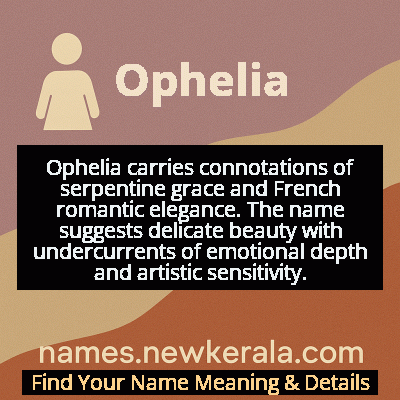Ophelia Name Meaning & Details
Origin, Popularity, Numerology Analysis & Name Meaning of Ophelia
Discover the origin, meaning, and cultural significance of the name OPHELIA. Delve into its historical roots and explore the lasting impact it has had on communities and traditions.
Name
Ophelia
Gender
Female
Origin
French
Lucky Number
3
Meaning of the Name - Ophelia
Ophelia carries connotations of serpentine grace and French romantic elegance. The name suggests delicate beauty with undercurrents of emotional depth and artistic sensitivity.
Ophelia - Complete Numerology Analysis
Your Numerology Number
Based on Pythagorean Numerology System
Ruling Planet
Jupiter
Positive Nature
Optimistic, inspirational, and creative.
Negative Traits
Scattered, exaggerating.
Lucky Colours
Yellow, gold, purple.
Lucky Days
Thursday.
Lucky Stones
Yellow sapphire.
Harmony Numbers
1, 2, 9.
Best Suited Professions
Arts, writing, communication.
What People Like About You
Creativity, optimism.
Famous People Named Ophelia
Ophelia Lovibond
Actress
Known for roles in 'Guardians of the Galaxy' and 'Elementary', establishing herself as a prominent British actress
Ophelia Dahl
Social Justice Advocate
Co-founder of Partners In Health, recognized for global health advocacy and humanitarian work
Ophelia Saint
Adult Film Actress
Award-winning performer in the adult entertainment industry
Ophelia Benson
Writer and Editor
Co-author of 'The Dictionary of Fashionable Nonsense' and prominent feminist writer
Name Variations & International Equivalents
Click on blue names to explore their detailed meanings. Gray names with will be available soon.
Cultural & Historical Significance
In French culture, the name became particularly popular during the 19th century Romantic period, where the French form 'Ophélie' was embraced by artists and writers captivated by her tragic beauty. The Pre-Raphaelite painters, especially John Everett Millais' famous 1851-52 painting 'Ophelia', cemented her image as a floating, flower-adorned figure of poetic melancholy. This French romantic interpretation transformed Ophelia from merely a Shakespearean character into an enduring archetype of feminine sensitivity and tragic grace that continues to influence artistic representations of delicate femininity.
The name's journey through cultural history reflects changing attitudes toward femininity, mental health, and artistic representation, making Ophelia not just a name but a cultural touchstone for discussions about women's roles in society and art.
Extended Personality Analysis
Individuals named Ophelia are often perceived as possessing a delicate, artistic sensibility combined with deep emotional intelligence. They tend to be intuitive, creative, and highly attuned to beauty in all its forms, whether in nature, art, or human relationships. This sensitivity often makes them excellent listeners and empathetic friends, though it can also leave them vulnerable to emotional overwhelm when faced with harsh realities or conflict.
The name carries associations of refinement and poetic nature, suggesting someone who appreciates the finer things in life while maintaining a certain innocence or idealism. Ophelias are frequently described as having a quiet strength beneath their gentle exterior, capable of profound loyalty and deep emotional connections. However, the literary shadow of Shakespeare's character also imbues the name with suggestions of potential vulnerability to external pressures and a tendency toward introspection that can border on melancholy when unbalanced.
Modern bearers of the name often embrace these artistic and sensitive qualities while developing resilience and self-awareness that transcends the tragic literary associations, creating a balance between delicate perception and inner fortitude.
Modern Usage & Popularity
Ophelia has experienced a significant resurgence in popularity since the early 2000s, particularly in English-speaking countries and France. After centuries of being considered too tragic or old-fashioned, the name has been reclaimed by parents attracted to its literary heritage, melodic sound, and vintage charm. In the United States, Ophelia broke into the top 300 names for girls in recent years, while in France, Ophélie remains consistently popular. The name appeals to modern parents seeking classic names with artistic and intellectual connotations, often chosen by those with an appreciation for literature, theater, or romantic aesthetics. Its revival reflects broader trends favoring Shakespearean names and vintage revivals, though it maintains an air of distinctive elegance that prevents it from becoming overly common. Contemporary usage often consciously references both the Shakespearean legacy and the name's beautiful phonetic qualities.
Symbolic & Spiritual Meanings
Symbolically, Ophelia represents the intersection of beauty and tragedy, innocence and experience. The drowning scene particularly associates her with water symbolism—emotions, intuition, and the subconscious. Her famous flower scene connects her to nature's transient beauty and the language of flowers, where each blossom carries specific meanings of love, remembrance, or sorrow. The serpentine description suggests both the dangerous allure and graceful movement associated with snakes in mythology, representing transformation, healing, and hidden wisdom beneath a beautiful exterior. Ophelia has become a feminist symbol of silenced female voices and patriarchal oppression, while simultaneously representing the enduring power of feminine sensitivity and emotional authenticity in a often harsh world. Her symbolism continues to evolve in contemporary interpretations that emphasize her agency and resilience rather than just her victimhood.

